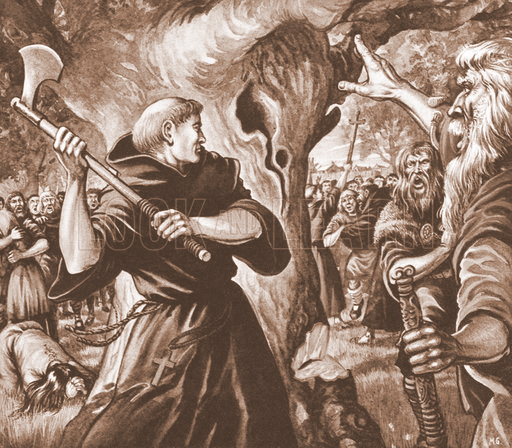It is again verses of Leconte de Lisle—that nostalgic singer of all the beauties destroyed by the inexorable march of Time—that come back to my memory when I think of ‘this worm weaker than the grasses’ of the ancient Forest, but strong in the omnipotence of its intelligence dedicated to the work of disintegration, the diabolical work (‘in reverse’ of the ideal order). The poet addresses the Forest, which seemed to last forever, and says:
Like a swarm of ants on a journey,
That one crushes and burns, yet still they march,
The floods will bring the king of the last days to you;
The destroyer of woods, the man with the pale face. [1]
Words that are only too true but if the White Man was indeed, until the middle of the 20th century, the ruthless destroyer of the forest as well as of the fauna—the massacrer of forty million bison in North America—, and who emptied North Africa and the former Asia of their lions, and India of most of its tigers and leopards, the Negro’ and the swarthy man of every hue, have, with grim enthusiasm, hastened to follow suit and pursue, with a neophyte’s relentlessness, the war of man against tree and animal.
They put themselves in the service of the White Man not necessarily and not always Aryan, and believed his lies, accepted his money, and assisted him in the work of destruction. They killed for him the elephants whose ivory he traded; hunted or trapped the big cats, whose magnificent skins he wanted. And, imbued with the anthropocentrism newly learned in his schools, and proud to possess at least some of his techniques, they continued the butchery after he had grown weary of it—even after belated remorse or awakening of his sense of self-interest had prompted him to ‘protect’ endangered species from now on.
 It is all mankind that is guilty of the usurpation of the soil at the expense of the forest and its ancient inhabitants—all except the few individuals or groups, always in the minority, who have protested against it all their lives, and proved, by everything they have said, written or done that they had taken a stand for the animal and for the tree against man, of whatever race he might be.
It is all mankind that is guilty of the usurpation of the soil at the expense of the forest and its ancient inhabitants—all except the few individuals or groups, always in the minority, who have protested against it all their lives, and proved, by everything they have said, written or done that they had taken a stand for the animal and for the tree against man, of whatever race he might be.
At the root of this indefinite usurpation is, without doubt, technology, which is, it must be admitted, the most inferior but an expression nonetheless of Aryan genius. Even in Roman times, when unfortunate wild animals were captured by the hundreds and thousands, to be sent to their deaths in circuses, the massacre of African, Asian (and European) fauna[2] never reached the proportions it was destined to reach in our time thanks to modern methods of hunting, and in particular to firearms.
But technology in all its forms, including this one, has developed only as an advantageous—sometimes the only possible—solution to the problems of survival of increasingly compact masses of men. It is only beyond a certain numerical limit that man, of whatever race, becomes a scourge to all that lives on the land he inhabits—and if he is of one of the inferior races (generally, alas, the most fertile), a dangerous rival to the nobler races: a veritable plague, in every respect.
_____________
[1] Leconte de Lisle, ‘La Forêt Vierge’, (Poèmes Barbares).
[2] And American. It is impossible here not to refer to the slaughter of seals, especially seal pups, so atrocious that many of our contemporaries themselves have been outraged.